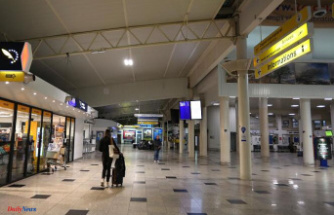The Corona Occupational Safety Ordinance ends. But does that also mean that everyone has to get out of the home office and masks in the office are a thing of the past? What you should know.
The time has come on February 2nd: Then the Corona Occupational Safety and Health Ordinance will be repealed - two months earlier than originally planned. But what does that actually mean for employees in the home office, what do employees have to be prepared for at work - and how can you continue to protect yourself from infection in the office, workshop and Co.? The most important questions and answers:
What has been the case so far?
The Corona Occupational Health and Safety Ordinance was last updated at the beginning of October 2022. It obliges employers to draw up a company hygiene concept based on a risk assessment - and to implement the necessary corona protection measures.
To this end, employers should observe measures such as maintaining a minimum distance of 1.50 meters between employees. Or reduce the simultaneous use of rooms by several people, for example by working from home. Regular test offers for employees or a mask requirement where a distance of 1.5 meters cannot be maintained should also be taken into account.
Employers also had to give employees time off to take advantage of external vaccination offers if necessary.
What will change in everyday work?
That depends above all on what the employer's operational hygiene concept previously provided for. Because whether employees should wear masks in certain situations, for example, could be determined independently by the respective company depending on the risk assessment.
In practice, with the exception of health facilities, care facilities and the like, in which special protective measures still apply, everyday working life should already have approached the everyday life of the pre-Corona period, says Anke Marx, lawyer at the Saarland Chamber of Labor.
However, if an employer's hygiene concept has so far stipulated that no more than two employees work in one office, for example, or that individual teams should not meet on site, the abolition of the Occupational Safety and Health Ordinance can have a greater impact. "Then maybe larger events with colleagues are conceivable again," says Marx.
Can the employer order me back to the office from my home office?
The Corona Occupational Safety and Health Ordinance, which applies until February 2nd, also does not provide for a right to work from home. "The employer only has to consider this option as part of the hygiene concept," says Nathalie Oberthür, a specialist lawyer for labor law in Cologne. "This will no longer apply, but will probably not have any significant effects. The decisive factor is which regulations apply to working from home in the company, there are no legal requirements."
However, if the hygiene concept of a company has so far provided for work in the home office, when the protective measures end, the employer can "allow the employees to work on site again within the scope of their managerial rights," says Marx. But only if there are no company agreements that go beyond the Occupational Safety and Health Ordinance that continue to apply - for example through individual or company agreements.
How can I continue to protect myself from Corona at work?
If the end of the Corona Occupational Safety and Health Ordinance means that there is no longer a test option or mask requirement in the respective company, employers no longer have to finance the corresponding tests and masks.
But anyone who wants to protect themselves, for example by wearing a mask in situations where work is sometimes crowded, can usually still do so voluntarily. "This can only be prohibited at reasonable discretion if operational interests conflict, for example with customer contact or if the work cannot be performed properly with a mask," says Oberthür. "However, the employer must of course guarantee the occupational safety required in each individual case."
The Federal Ministry of Labor and Social Affairs (BMAS) also recommends "continuing to implement proven protective measures in companies and administrations even after the SARS-CoV-2 Occupational Health and Safety Ordinance has expired on February 2, 2023" for operational protection against Covid-19, flu and colds. to avoid infections at work and to minimize staff absences due to illness".
According to the BMAS, this includes above all the AHA L rule, i.e. keep your distance, observe hygiene, wear masks, ventilate properly. Ultimately, employees can use this as a guide and open the windows regularly, for example.
Can I continue to be vaccinated against Corona during working hours?
"Due to the early expiry of the Corona Occupational Safety and Health Ordinance on February 2, 2023, the employer's obligation to support vaccinations also ends," says Marx.
Vaccinations could then - like any other visit to the doctor - only be taken during paid working hours if an appointment outside of working hours cannot be made, explains Cologne specialist lawyer Nathalie Oberthür.












